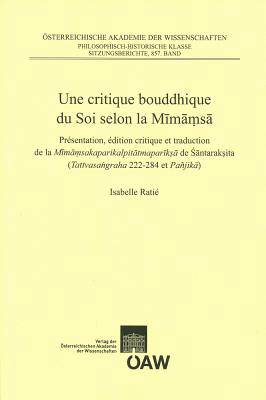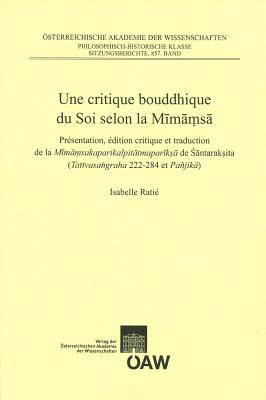
- Afhalen na 1 uur in een winkel met voorraad
- Gratis thuislevering in België vanaf € 30
- Ruim aanbod met 7 miljoen producten
- Afhalen na 1 uur in een winkel met voorraad
- Gratis thuislevering in België vanaf € 30
- Ruim aanbod met 7 miljoen producten
Zoeken
Une Critique Bouddhique Du Soi Selon La Mimamsa
Presentation, Edition Critique Et Traduction de la Mimamsakaparikalpitatmapariksa de Santaraksita
Isabelle Ratie
Paperback | Frans
€ 99,95
+ 199 punten
Omschrijving
This book contains a critical edition, translation, and analysis of 62 Sanskrit verses from the Tattvasangraha, a Buddhist philosophical tract from the 8th century written by the Santaraksita, and the commentary on them written by his disciple, Kamalasila. The passage explains and criticizes the definition of Self (atman), which was derived through the greatest proponent of brahamanic orthodoxy, the Mimamsa scholar and philosopher Kumarila Bhatta (6th-7th century?). According to Kumarila, there is in every person a durable, conscious substance, which ensures the reliability of personal-identity and validates the Vedic injunction concerning sacrifice, in order to be able to enjoy the fruits of rituals later. It is this entity which we recognize when we say and think I: in the I-awareness, we understand ourselves as the same conscious mind, which has experienced in the past and still experiences. For their part, Santaraksita and Karmalasila attempted to defend the Buddhist doctrine, which argued that there was no Self (nairatmya)--according to the mistaken belief that existential suffering was rooted in a fixed subject- in which they show above all that those conditions of self-awareness promoted by Kumarila to be merely mental constructs. The text is an important document for the history of Indian philosophy, not only because it contains numerous citations from the Brhattika (a lost work of Kumarila) and represents possibly the earliest, extent Buddhist criticism of Kumarilas definition of self, but also because it offers an excellent example of how religious rivalry stimulated and enriched philosophical debates in medieval India. This book contains a study of the arguments by Kumarila, Santaraksita, and Kamalasila (Chapters 1 and 2), an assessment of the originality and influence of Santaraksitas critique (Chapters 3 and 4), a tentative interpretation of the type of philosophical disagreement in the milieu between Buddhism and Brahmanism (Chapter 5), as well as a critical edition and translation of the text (Chapters 6 and 7).
Specificaties
Betrokkenen
- Auteur(s):
- Uitgeverij:
Inhoud
- Aantal bladzijden:
- 371
- Taal:
- Frans
Eigenschappen
- Productcode (EAN):
- 9783700176657
- Verschijningsdatum:
- 21/10/2014
- Uitvoering:
- Paperback
- Formaat:
- Trade paperback (VS)
- Gewicht:
- 671 g

Alleen bij Standaard Boekhandel
+ 199 punten op je klantenkaart van Standaard Boekhandel
Beoordelingen
We publiceren alleen reviews die voldoen aan de voorwaarden voor reviews. Bekijk onze voorwaarden voor reviews.











